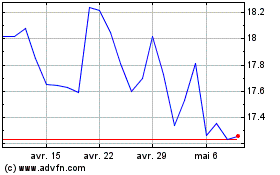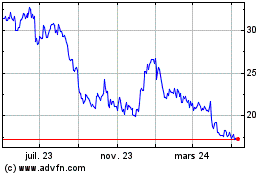CVS Eases Concerns About Aetna Deal --Update
01 Mai 2019 - 7:32PM
Dow Jones News
By Sharon Terlep and Anna Wilde Mathews
CVS Health Corp. delivered stronger-than-expected results in its
first quarter as a combined health-care company, taking a step
toward selling skeptical investors on its acquisition of insurer
Aetna Inc.
The Woonsocket, R.I.-based company, which completed the nearly
$70 billion takeover in November, said the insurance business
performed well while the company saw stronger profits on brand-name
drugs and increased sales at its drugstores.
The results mark a shift from February when the company offered
a downbeat earnings projection for 2019 that sent shares tumbling.
The performance also distinguishes CVS from rival Walgreens Boots
Alliance Inc., which reported weaker profits in the most recent
quarter and lowered its forecast citing smaller profits from
generic drug sales.
The company is under pressure from investors, who are pushing
for a clearer picture of its growth prospects. Investors' focus
will now shift to the company's planned investor day set for June
4, when it has promised to give a more detailed look at its
plans.
The Aetna acquisition created an industry giant that combines a
retail pharmacy, pharmacy-benefit manager and Aetna's insurance
businesses.
CVS shares had lost a third of their value since it completed
the Aetna deal, erasing roughly $34 billion of market value. Shares
were up about 5% in afternoon trading.
"None of us are happy with where our stock price is," CVS Chief
Executive Larry Merlo said in an interview. "From our perspective
we're very early. We're creating a pathway that no one has gone on
in an effort to make health care more local and make it more
simple."
"Considering that expectations have been low, we see this as the
first positive catalyst that restores investor confidence in this
Management team and drive multiple expansion," SVB Leerink analyst
Ana Gupte said.
One sign of investors' discontent came at a lunch meeting that
Mr. Merlo and finance chief Eva Boratto held with investors in
early March. The meeting was tense, according to an investor who
attended, with the audience pressing the company for a clearer
picture of its financial projections for future years. In a note
describing the March meeting that came out soon after it occurred,
UBS analyst Kevin Caliendo wrote that there appeared to be a
"growing credibility issue with investors on how the company is
framing the organic path forward for the retail, and consternation
that synergy realization isn't flowing enough to the bottom line to
generate accretion from the deal."
The first-quarter CVS results and call with analysts "will help
investor sentiment," Mr. Caliendo said Wednesday. "The next big
hurdle is going to be visibility on 2020 earnings and earnings
growth."
Analysts said that many of the challenges facing CVS are tied to
the nature of its core businesses and the policy landscape, and
similar issues have hit its competitors.
The health-insurance sector has also recently seen shares slump
even among companies with strong earnings results, due to investor
worries about policy matters including some Democrats' interest in
universal government-provided health insurance.
CVS has said its deal to bring together drugstores, a
pharmacy-benefit manager and an insurer would help it cut
health-care costs and improve care. Mr. Merlo has talked about how
the merged company will help smooth the fragmented health-care
experience for consumers.
CVS is also remaking some of its stores into new health hubs,
offering a broader range of services, many aimed at people with
chronic health conditions such as diabetes. The company has said it
hopes to save money and bolster care by improving patients'
adherence to their prescriptions and pushing care to lower-cost
sites, reducing use of emergency rooms.
"Our first full quarter of combined operations was a success in
many ways," Mr. Merlo said in a statement.
On Wednesday, the company reported a first-quarter net income of
$1.4 billion, or $1.09 cents a share, up from a profit of $998
million, or 98 cents a share, a year earlier.
The company, which realigned its reporting segments to reflect
the combined company, said Aetna contributed $16.6 billion in
revenue to its health-benefits segment that was bolstered by strong
sales of Medicare products.
CVS reported stronger retail sales from its drugstore chain,
which it attributed to success in selling more health-focused
offerings, and an increase in pharmacy claims. Prescription volume
grew 5.5% from the same period a year ago.
Same-store sales increased 3.8%, beating the FactSet estimate of
a 1.2% increase. The retail business will continue to be challenged
by lower margins on prescription drugs that will last throughout
the year, Mr. Merlo said.
CVS raised it forecast, saying it expects adjusted earnings per
share of $6.75 to $6.90, up from $6.68 to $6.88. The improved
outlook remains below analyst expectations headed into 2019.
Write to Sharon Terlep at sharon.terlep@wsj.com and Anna Wilde
Mathews at anna.mathews@wsj.com
(END) Dow Jones Newswires
May 01, 2019 13:17 ET (17:17 GMT)
Copyright (c) 2019 Dow Jones & Company, Inc.
Walgreens Boots Alliance (NASDAQ:WBA)
Graphique Historique de l'Action
De Mar 2024 à Avr 2024

Walgreens Boots Alliance (NASDAQ:WBA)
Graphique Historique de l'Action
De Avr 2023 à Avr 2024
